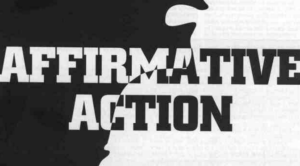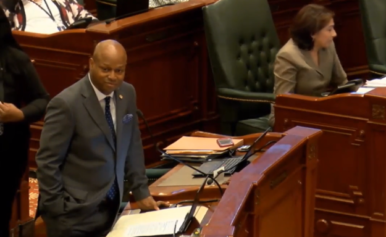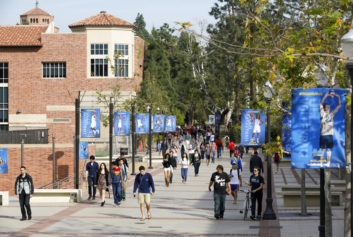
The case before the high court, Fisher v. University of Texas at Austin, involves a mediocre white woman named Abigail Fisher who claims her application for admission to the university was rejected because of her race, in favor of applicants of color. This, despite evidence to the contrary.
NPR decided to look at the affirmative action issue by speaking to students at two suburban Washington D.C. area high schools, including a predominantly Black school, and another whose student body is a mixture of Black, Latino, Asian and white.
Donavan Harvey, 16, believes race should be a factor in college admissions.
“We hear all the time about the racial disparities in K-12 education slanted against minorities, particularly African-Americans and Latinos,” Donovan, who is African-American, told NPR. “So to me, it doesn’t make any sense [that] when we’re talking about higher education, oh, now it becomes colorblind. Now we’re not going to look at race.”
Anh-Thi Le, 17, a Vietnamese-American student and a high school senior, noted that Asian students are over-represented in prestigious colleges, which means that these schools might view her as just another Asian student. Le said that it is just as difficult for poor immigrant families as Black and Latino families, who have no guidance regarding college admissions and no resources for SAT prep courses.
Raiye Seyoum, 16, a junior, does not like affirmative action programs.
“I don’t feel it’s really fair. If they [schools] feel like, ‘Oh, there aren’t many Latino kids, let’s accept them,’ ” she said. “What about that person who’s working way harder? Just because you want to add a Latino person to your population … it’s really just not fair.”
Finally, Calvin Stinson, 17, who is white, has good grades, and says regarding affirmative action that “if it gives me a disadvantage, so be it.”
The attitudes of a younger generation, of millennials, concerning programs aimed toward diversity, inclusion and racial equity are instructive. This comes as college campuses throughout the nation are embroiled in racial conflict, and with young whites exhibiting the same levels of racial hatred as their parents and grandparents. The white conservative movement has done a remarkable job of painting even modest efforts at leveling the playing field as racially discriminatory towards whites, or so-called “reverse racism,” which is nonexistent and a figment of the white supremacist imagination.
In reality, diversity programs are just as beneficial to white women as they are to Blacks and other historically oppressed people. The fact of the matter is that in a nation that is loath to speak about race, much less to address and eradicate white supremacy and skin privilege, any efforts to increase opportunity to Black people are frowned upon and shunned. And in a society where white people, especially white men, were granted all of the spots, all of the seats in school and employment and everywhere else, white privilege became normalized. Anything that veers from that normal state of affairs, of whites being on top and exclusive, is perceived in the world of white privilege as unfair. Because after all, whites are entitled to the whole pie, and anything less than everything is an injustice, or so it goes.
For the centuries that everything was bestowed upon white men, there were no cries or screams of unfairness. When white students were granted admission to college because they played a sport, or because they were musicians, or because their parents had attended the school and gave a large donation, there was no outrage. However, now that Black people want a piece of the pie as well, even a slice, suddenly opportunity is a zero-sum game. And there is not enough of the pie for everyone, so if Black people gain just a bit, it is perceived as occurring to the detriment of whites. And as the story goes, whites are more deserving. All of this is based on the premise that Blacks are inferior, unworthy and lacking merit, which is the whole point of white supremacy in the first place.
And we haven’t even begun to discuss reparations.


